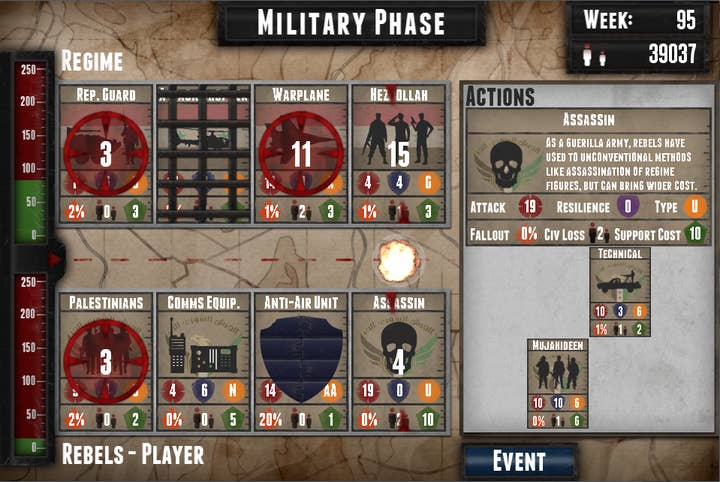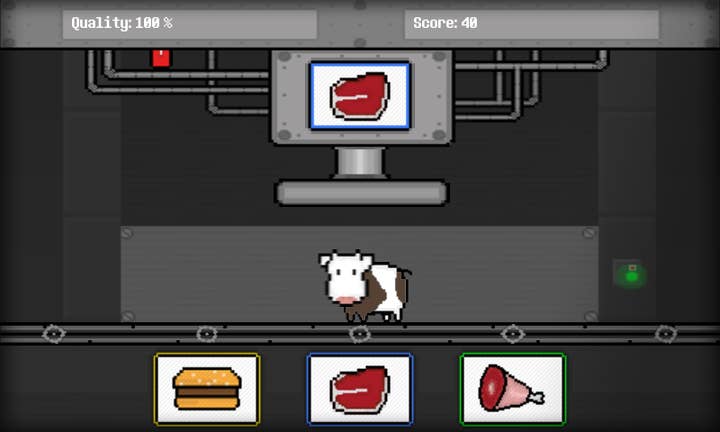Playing the headlines
What devs can learn from Newsgame development
Over at indie developer Auroch Digital we run an newsgame initiative called 'GameTheNews'. If you've not heard of newsgames before, they are short, topical games based on news and current affairs. They can be fun, more like a playable political cartoon, or they can be serious (or a bit of both).
One of the things that makes them interesting from a development point-of-view is that they need to be made fast. Really fast. We're not the only people looking at this new area; far from it, BuzzFeed is there, the BBC too, and other major news companies are taking notice of this new area. Our host, Professor Janet Jones sums up what a news game is as, "It's a new tool in the journalist's toolbox, good for explaining complex systems and interrelations that text or linear video can't. Newsgames can report the world in a more dynamic way, one that uses game-play with its unique power to produce real knowledge about real things with impact on the real world. This will re-engage news-shy audiences more accustomed to discovering things through digital play."
We recently took part in a newsgame jam at London South Bank University alongside developers from BuzzFeed; in that room were people who'd collectively made something like 80 newsgames in the last couple of years. That's a lot of development in a short space of time. Back in my days as a developer at a bigger studio I spend around 3 years on a single game. By contrast we've made a newsgame in a single working day. What was interesting about this gathering of developers is how much we had in common about how we created games, even though we'd arrived at those same methodologies from very different directions... (and I should thank Paul Curry of BuzzFeed, as his presentation on the day was what inspired this article!) So this article gives you some advice from the frontlines of super rapid game creation with some ideas you can try, even if you don't create newsgames yourself.

The growing importance of newsgames can be summed up by Tom Phillips from BuzzFeed; "People like games. People like news too, but if we're honest lots more people like games. Games (in all their forms) are one of the dominant mediums of our time. I mean, why wouldn't you use them for news? It'd be like somebody in a previous age saying you couldn't use film, or TV, or stage plays, or novels (or whatever the scary new medium was at the time) to talk about things that were topical and factual and morally urgent and maybe also sometimes funny. And that would have made our culture worse. It's not a case of 'why would you do this?'; it's more a case of 'why the hell wouldn't you do this?"
Establish Roles and Keep them Updated
It's important to keep track of who is doing what. A "burn-down" list which people are assigned tasks from is ideal. These tasks can be loosely grouped by discipline, which will help you balance task load among the team evenly. Keep it up to date, and make sure the whole team has visibility of who is working on which task; a real-time Google Document, or even just a chat program status message can be a useful way to communicate this. When everyone has timing and task progress visibility, you can often avoid 'but I thought they were doing that?!' moments happening just before you're due to launch. Paul notes on this point, "Deliverability is absolutely key in a timely scenario like a hack day. Cribbed loosely from Agile methodologies, the basic idea of "ship a working product very quickly, then make it better in stages" is a great place to start. And by "very quickly", we're talking a task list and first skeletal version of the product within an hour. You can never deliver a non-working product this way - only one which is imperfect. When a lot of the focus in a project is on the concept and timeliness, rather than a perfect, polished execution, it's important to think this way. As long as you have a diverse team and clear plan, the only "magic" is in intelligent time management and cogent team communication."
Ditch Your First Idea (Ideas are Cheap)
When you're coming up with an idea for a game the first couple of ideas are normally the safest. They are also normally the most obvious and so the less interesting. So do draw a list of ideas up at that start point, then chop the first few and work from there. Newsgames are a great way for force the creative process because you're having to come up with an idea for a topic that might be difficult; dry or emotional or complex. It's a great design challenge always!
Collaborative Tools are Best
There are a host of tools from Google Docs to Asana to Slack that allow teams to work together on documenting the game. We've been using Google Docs for GDDs (Game Design Documents) for some time now; the real-time updated nature of the document stops the 'I was reading the wrong version' problem and the ability to add comments and multiple real-time editors is a huge advantage. Back in the day I'd have folders of v1, v2, v3 documents and I've also experimented with wikis for this (which as great tools too) and also shared folders like Dropbox (but then you have the version problem if one person has it open). Any tool that lets you all contribute in real-time is going to save you time and effort.

Divide Your Project into Core and Stretch Goals
Feature creep is a major issue in any project, but when you're measuring your total development time in hours not months, it houses even more dangers. To counter the danger be clear about what is the core experience; that is what in the gameplay it would be impossible to do without - in that there is no game without feature X and Y then classifying everything else as bonus features helps you focus on what matters. In game jams I've see so many almost amazing games half implemented alongside the simple ideas, but they work. Getting a complete core is a zero-sum feature; there is no game without it. So be clear about what it is and feed that back into the roles and responsibilities. That way you plan better with what you have and be pleased when you get bonus features in.
Doing Counts the Most
One of the pluses of newsgames (and any rapidly prototyped idea) is that the cost of failure is much lower. Before I got into game jams and newsgames, I'd spent a year working on a title. Happily it turned out rather well, but it might not have. Problem is it would have been a whole year before we found that out. By creating the core in hours/days you can get it into the hands of players and know the polished version that might take months to complete will work. If you're going to risk years of developer time on an idea; it's reassuring to know the end result will work, so jam it first!
